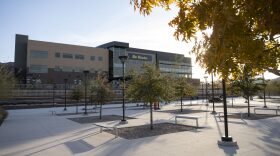From the cigarette-inhaling poker player to the cigar-chomping high roller, smoking while gambling has been part of Nevada since the first casinos opened.
But things may be changing in the era of COVID-19, which doesn’t mix well with smoking.
Casinos are boasting protections of all sorts to lure nervous patrons back — plexiglass partitions, the circulation and filtering of air, and face mask requirements.
But those protocols often don’t include smoking or protecting casino workers from it. So the question keeps coming up: Should casinos finally go smoke-free?
One has: Last week, Park MGM reopened as the first non-smoking property on the Strip in 26 years. Hotel management said guests asked for it.
With other casinos making tweaks in their smoking policies, is Las Vegas turning a page on one of its longest traditions?
David Schwartz is a gaming author and the associate vice provost for Faculty Affairs at UNLV, where he also served as the director of the Center for Gaming Research.
"Certainly, there is a perception that smokers are very serious gamblers and I think that definitely factors into this perception that people who smoke, while numerically they're a minority of the customer base, they might generate a lot more of the casino revenue," Schwartz said.
The problem, Schwartz said, is that while people can see those who won't gamble because of non-smoking rules, it is a lot more difficult to see who would come because casinos are smoke-free.
"I think that is definitely a consideration," he said, "But it is a lot harder to quantify than saying, 'We're going to lose this much business.'"
In addition, fewer younger people are smoking and casinos have been trying to lure in younger gamblers for a while now. Schwartz said casinos need to keep current with what is acceptable in public, and smoking is in that category.
"At one time it was acceptable to smoke in lots of places," he said. "I think America has gotten away from that in a lot of ways. It used to be okay to smoke on airplanes and in movie theaters, and I think, this could be the next step."
There have been attempts in the past to ban smoking. Smoke-free casinos in Reno and Las Vegas both went back to allowing smoking one year and three years, respectively, after banning it.
Casinos in Macau banned smoking in 2013 and they did report an initial drop in revenue. However, a study in 2016 found that Las Vegas-based casinos in Macau saw their stock values increase after the smoking ban.
"I think this shows that people will adjust," Schwartz said, "As a non-smoker, I adjusted to dealing with smokers when I was working at a casino. So, it makes sense that smokers would adjust to not smoking in a casino."
Schwartz notes that things change all the time in the gaming industry, and people adjust. For instance, when casinos originally moved away from coin slots to tickets, many people in the industry said it wouldn't work because gamblers liked to carry around their buckets of coins, and they like to hear the clink of the coins coming out of the slots.
However, Schwartz pointed out that it turned out people didn't like dealing with coins or waiting for a payout, and much preferred getting a ticket.
"I think there are a lot of outcomes," he said. "I think the casinos are going to have to balance with: If we have smoking, we believe we can retain these customers. If we don't allow it, then we might be able to spend less on some of the mitigation and some of the HVAC. We have a lot of ancillary costs that might go down."
He said if casinos are going to look at the issue from a financial point of view, they would have to make those considerations.
There is no question that smoking is not good for people's health and second-hand smoke is also dangerous.
But in the era of COVID-19, there are extra problems with smoking, said Kelli Goatley-Seals, president of the Nevada Tobacco Prevention Coalition and the health education coordinator for Washoe County Health District.
"What has to happen is those people have to remove their masks to smoke and so there's a couple of concerns," she said, "There's the concern of the second-hand smoke exposure. People removing masks and then potentially projecting that virus into the environment."
In addition, Goatley-Seals said the act of putting something into your mouth, taking it out and then touching things around you is concerning during a pandemic.
However, the outbreak may be a chance to get the word out about the dangers of smoking and second-hand smoke.
"We've definitely seen COVID-19 as an opportunity to educate people as well as have people hear the message in ways that they weren't willing to hear it before," she said.
When Nevada passed the Clean Indoor Air Act, casinos, bars and some other locations were exempt.
She is hopeful the Park MGM's nonsmoking development will show others that is possible to ban smoking and make a profit.
"I think the Park MGM going smoke-free is a great step for our state so we can see that it is possible here in Las Vegas. People will still go to these properties and they will be successful economically," she said.
Goatley-Seals agreed with Schwartz that times have changed, and many people do not find it acceptable to allow smoking indoors.
"The social norms - what the expectations are and the willingness of people to be in environments where they're not comfortable, where they have to go home smelling like cigarettes, and they're not a smoker - people aren't as patient and tolerant of those types of things anymore," she said.
David Schwartz, gaming historian and professor, UNLV; Kelli Goatley-Seals, President, Nevada Tobacco Prevention Coalition and Health Educator Coordinator, Washoe County Health District










